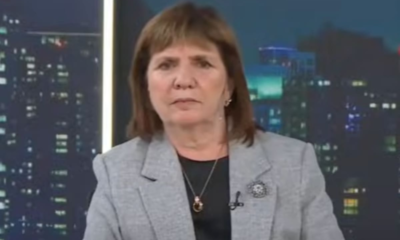INTERNACIONAL
Fox News Poll: The GOP is seen as more likely to have a clear plan for the country
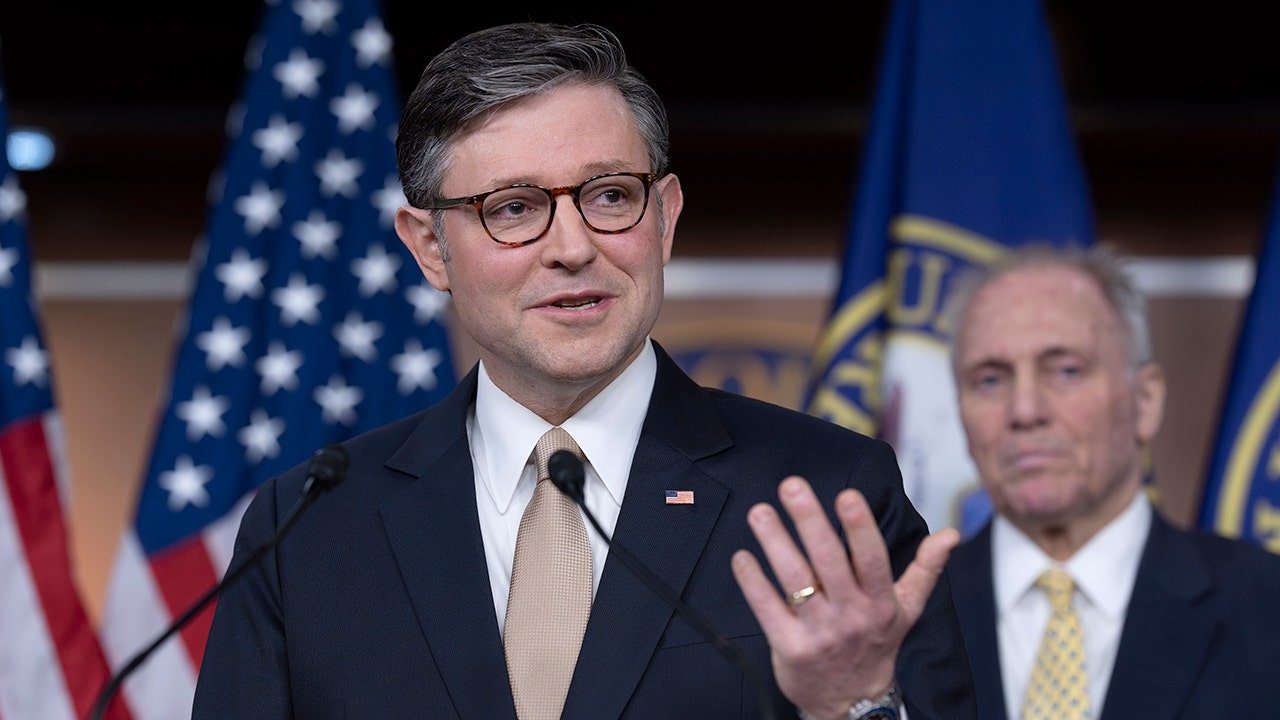
NEWYou can now listen to Fox News articles!
With the 2026 midterm elections more than a year away, a new Fox News survey finds that while the Republican Party has lost some ground to the Democratic Party on handling key issues, voters are more likely to think the GOP has a clear plan for dealing with the country’s problems.
The survey, released Thursday, finds that by a 10-point margin, more voters think the Republicans have a clear plan for the U.S. than the Democrats: 43% vs. 33%. Still, majorities feel neither the GOP (54%) or the Democrats (64%) have a plan. This is about where sentiment was three years ago, the last time the question was asked.
FOX NEWS POLL: TRUMP FACING HEADWINDS AT SIX-MONTH MARK
Far more Republicans (79%) than Democrats (51%) are confident their party has a clear plan, and that’s what hurts the Democrats. While at least two-thirds of independents feel neither party has a plan, more trust the GOP (30% vs. 25%).
At the same time, the survey shows some significant erosion in the GOP’s handling of key issues compared to the last time Fox asked in 2023, including in areas where they are traditionally preferred.
Voters view the Republican Party as better able to handle national security (by 14 points), immigration (+6R), and government spending (+5R) while the Democratic Party is favored on climate change (by 23 points), health care (+19D), social security (+17D), education (+15D), and energy policies (+6D).
The parties are rated about equally on inflation (+1D), gun policy (even), the economy (+1R), and foreign policy (+3R).
Compared to 2023, support for the GOP is down on immigration by 4 points, national security by 6, government spending by 6, foreign policy by 9, and the economy by 14. Plus, the Republicans’ 12-point advantage on inflation has disappeared, as Democrats have a 1-point edge today.
While the Democrats have largely maintained support on their best issues, it’s noteworthy they saw a 12-point increase on education, as voters have been split on who would better handle the issue for the last few years.
FOX NEWS POLL: APPROVAL OF SCOTUS AT 5-YEAR HIGH, REBOUNDING FROM RECORD LOW IN 2024
These shifts can mostly be attributed to self-identified Democrats solidifying their preference for their own party’s handling of the issues, as well as independents lessening their support for Republicans or switching to Democrats.
Self-identified Republicans continue to express high levels of support for their party on the issues.
«Independents and even some Democrats had soured on President Biden and the Democratic Congress by 2023 and 2024, but they have shifted to the left a bit in 2025 in response to the policies of President Trump and the Republicans,» says Republican pollster Daron Shaw, who conducts the Fox News survey with Democrat Chris Anderson. «An appreciable part of this is performance related. Without obvious economic and foreign policy victories, independents and soft Democrats could drift to the left, which could scramble the electoral dynamic heading into 2026.»
Overall, views of both major political parties are underwater. By 2 points, the Republican Party has a slightly better favorable rating (44% favorable) than the Democratic Party (42%), but more than half view both parties negatively (56% and 57% unfavorable, respectively). That’s relatively unchanged since April.
Positive views of the Republican Party have shown steady growth since October 2019, while the Democratic Party has been on a downward trajectory, reaching a record low in April (41% favorable).
The Republican Party enjoys more support among their party faithful (83% have a favorable view) than the Democratic Party (78% favorable). Seven in 10 independents have a negative view of both.
CLICK HERE FOR CROSSTABS AND TOPLINE
Conducted July 18-21, 2025, under the direction of Beacon Research (D) and Shaw & Company Research (R), this Fox News survey includes interviews with a sample of 1,000 registered voters randomly selected from a national voter file. Respondents spoke with live interviewers on landlines (114) and cellphones (636) or completed the survey online after receiving a text (250). Results based on the full sample have a margin of sampling error of ±3 percentage points. Sampling error for results among subgroups is higher. In addition to sampling error, question wording and order can influence results. Weights are generally applied to age, race, education, and area variables to ensure the demographics of respondents are representative of the registered voter population. Sources for developing weight targets include the American Community Survey, Fox News Voter Analysis and voter file data.
INTERNACIONAL
Cómo una ciudad fronteriza china mantiene a flote a la economía rusa
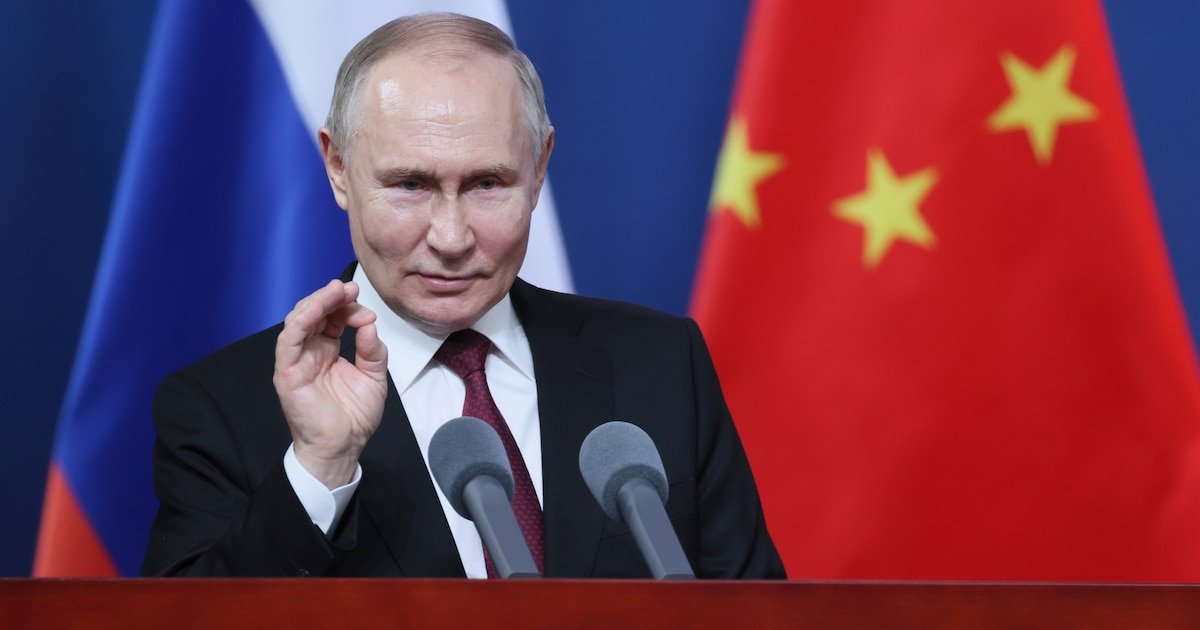
Miles de toneladas de madera siberiana cruzan la frontera hacia China por la ciudad de Manzhouli, donde son procesadas para fabricar componentes de muebles y palillos, mientras grandes cargamentos de colza rusa llegan para su conversión en aceite de canola. El dinamismo en este cruce fronterizo refleja cómo las economías de ambos países han reforzado su interdependencia desde la invasión rusa de Ucrania en febrero de 2022.
El comercio bilateral superó los 240.000 millones de dólares el año pasado, un incremento del 66% respecto al periodo previo al conflicto. China se ha consolidado como el mayor comprador de petróleo, madera y carbón rusos, y se encuentra próxima a convertirse en el principal destino del gas natural de Rusia. Además, los datos muestran que el intercambio no solo incluye materias primas: el flujo de productos manufacturados chinos hacia Rusia, como ropa, electrónica y vehículos, ha crecido un 71% desde el inicio de la guerra.
Manzhouli mantiene un rol central en este intercambio. La ciudad, que cuenta con una línea férrea construida por Rusia en 1900, ve diariamente el paso de trenes y camiones cargados de materias primas. El eslogan económico oficial describe el modelo como “suministro ruso, procesamiento chino”, remarcando la función de Rusia como proveedor de materias primas para la industria manufacturera china, que supera ampliamente en escala a la rusa.
Cerca del 6% de la economía rusa ya depende de las exportaciones a China, una proporción comparable a la de Irán, otro país afectado por sanciones internacionales. A consecuencia de las restricciones impuestas por decenas de naciones a la economía rusa, Moscú ha reorientado su comercio exterior hacia el este, dependiendo cada vez más de su relación económica con Beijing.
En la actualidad, Rusia abastece a China de recursos como maderas de pino para construcción y mobiliario, abedul blanco para palillos, álamo para molduras y olmo resistente para soportes de minas de carbón, mientras importa del gigante asiático equipamiento industrial, bienes de consumo y automóviles. Según la Organización de las Naciones Unidas para el Desarrollo Industrial, la cuota de Rusia en la manufactura global es de solo 1,33%. China, en cambio, produce el 32% de los bienes manufacturados en el mundo.

Esta asimetría ha hecho que Rusia adopte un papel de proveedor de materias primas y consumidor de productos acabados chinos, consolidando en la frontera de Manzhouli el epicentro de una relación comercial estratégica marcada por el cambio de poder económico y la influencia de las sanciones internacionales.
La postura de China frente a la guerra en Ucrania ha fortalecido su relación con Rusia y generado fricciones con la Unión Europea (UE). Según directivos de ambos países, como el ministro de Asuntos Exteriores chino, Wang Yi, tras reunirse con su homólogo ruso, Sergey V. Lavrov, “las relaciones chino-rusas representan la relación entre grandes potencias más estable, madura y significativa en materia estratégica en la actualidad”. El suministro de drones y componentes por parte de empresas chinas para su uso en el conflicto destaca como muestra concreta de este apoyo.
Para la Unión Europea, esta colaboración ha suscitado preocupación. En una cumbre celebrada en Beijing, los dirigentes comunitarios solicitaron nuevamente a Xi Jinping, principal líder chino, que redujera la cooperación económica e industrial de China con Rusia en el contexto de la guerra. Ursula von der Leyen, presidenta de la Comisión Europea, advirtió que el posicionamiento chino en el conflicto sería “un factor determinante” para las futuras relaciones bilaterales y que el respaldo continuo de China a Rusia genera “inestabilidad e inseguridad en Europa”.
El desplazamiento de importaciones de China hacia productos rusos ha tenido consecuencias para terceros países, como Canadá. Tras posicionarse junto a Estados Unidos y respaldar el aumento de aranceles a productos chinos, Canadá vio cómo China sustituyó importaciones de materias primas, especialmente la colza, optando por proveedores rusos. En represalia, el gobierno chino impuso aranceles del 100% a las importaciones canadienses de aceite y harina de canola, además de iniciar una investigación comercial sobre el envío de colza canadiense.
Estas medidas repercuten directamente en la estructura de las cadenas de suministro en Asia y contribuyen a realinear los flujos globales de materias primas, al tiempo que evidencian el uso de instrumentos comerciales para la presión política y la competencia por mercados estratégicos.

Las relaciones comerciales entre China y Rusia han mostrado señales puntuales de tensión, principalmente en el ámbito de las materias primas y el mercado automovilístico. Autoridades rusas prohibieron la exportación de pino recién cortado hacia territorio chino, imponiendo que la corteza se retire y los troncos sean aserrados en serrerías siberianas antes de su envío. Esta medida ha incomodado a empresarios chinos como Huang Baoqiang, gestor de un aserradero cercano a la frontera, que ve encarecido y complicado el acceso directo al recurso.
En respuesta a la competencia rusa en el sector energético, China introdujo aranceles a la importación de carbón ruso a principios del año pasado, tras el incremento de la producción de sus minas estatales. Estas acciones muestran que, pese al estrechamiento de la alianza, ambos gobiernos priorizan la protección de sus respectivas industrias cuando los intereses nacionales chocan.

El mercado automovilístico ruso ha experimentado una transformación significativa tras la retirada de los fabricantes occidentales después de la invasión a Ucrania. Los vehículos fabricados en China pasaron de tener una presencia marginal en 2021 a abarcar el 60% de las ventas en Rusia a finales del año pasado, según la consultora GlobalData Automotive. Ante el retroceso de las marcas occidentales, el gobierno ruso impuso desde el 1 de octubre una tasa de importación de 7.500 dólares a los automóviles nuevos, aunque dejó exentas las compras de autos usados por ciudadanos rusos.
Empresarios chinos en Manzhouli han aprovechado esta excepción. A poca distancia de la frontera, una sala de exhibición de autos usados, con una monumental puerta de bronce y un vestíbulo de 24 metros de altura, ofrece a los compradores rusos modelos casi nuevos de marcas como BMW, Land Rover, Volkswagen, y también de firmas chinas como Zeekr y Hongqi, permitiendo la exportación a Rusia sorteando el nuevo arancel. La ausencia de automóviles completamente nuevos y el aumento en la demanda de usados reflejan la rápida adaptación comercial ante las barreras regulatorias impuestas en el intercambio bilateral.
INTERNACIONAL
Trump administration releases over $6B in frozen education funds to the states
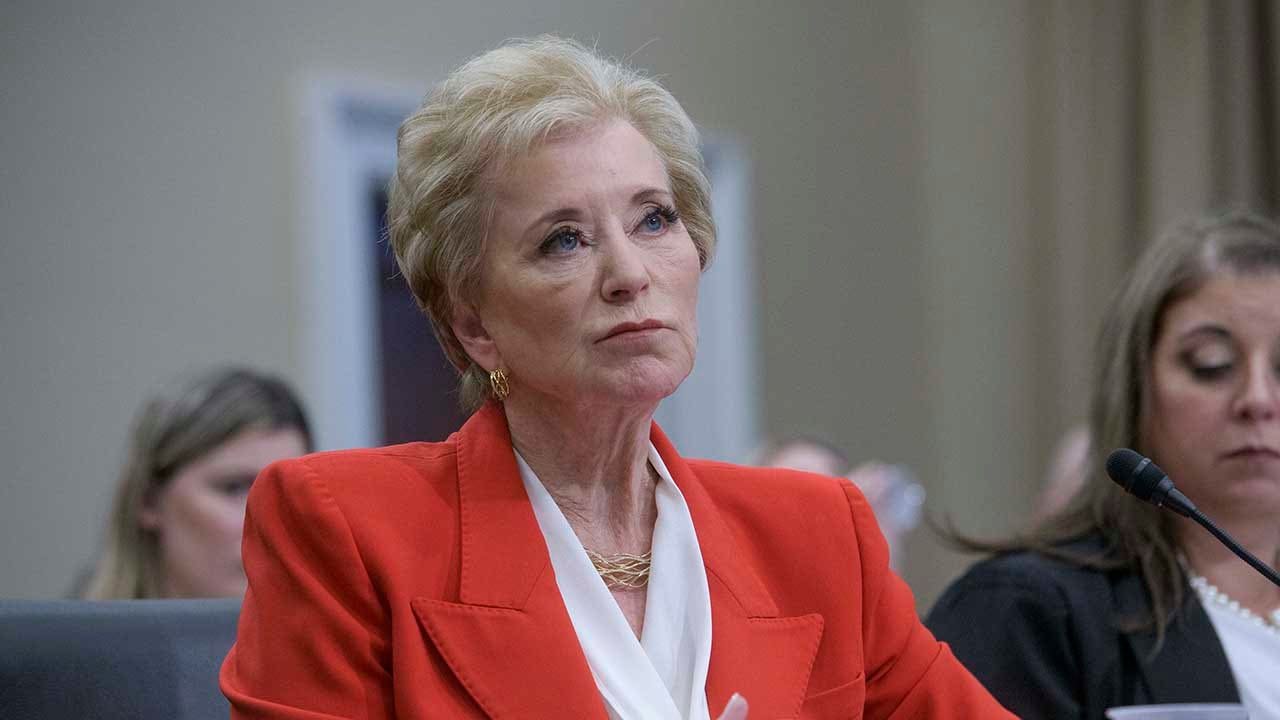
NEWYou can now listen to Fox News articles!
The Trump administration is releasing roughly $6.8 billion in previously frozen federal funds for K-12 programs, the Department of Education announced Friday. The announcement was made as Secretary Linda McMahon attended the National Governors Association (NGA) Summer Meeting in Colorado Springs, Colorado.
The Office of Management and Budget (OMB) «has completed its review of Title I-C, Title II-A, Title III-A and Title IV-A ESEA funds and Title II WIOA funds and has directed the Department to release all formula funds. The agency will begin dispersing funds to states next week,» department spokesperson Madi Biedermann told Fox News Digital.
More than 20 Democratic attorneys general sued the Trump administration earlier this month, describing the Department of Education’s federal funding freeze as unconstitutional and «debilitating» to states just weeks ahead of a new school year.
The bipartisan group of governors, including the NGA’s outgoing chair, Gov. Jared Polis of Colorado, and its vice chair, Gov. Kevin Stitt of Oklahoma, thanked McMahon for unlocking the funding during the NGA’s education session Friday.
DEMOCRAT AGS SUE TRUMP FOR ‘UNCONSCIONABLE’ FREEZE ON $6.8B IN K-12 SPENDING
Secretary of Education Linda McMahon testifies at a House Committee on Appropriations subcommittee budget hearing on the Department of Education on Capitol Hill May 21, 2025, in Washington. (AP Photo/Rod Lamkey, Jr.)
«How can we better communicate to make sure that this chaos and uncertainty doesn’t occur again around funding and that people know things earlier?» Polis asked McMahon on the Colorado Springs stage.
«No guarantees from me that we will eliminate all the communications gaps that do happen, but I can say that part of it is just the transition aspect,» McMahon explained.
The education secretary said the other aspect of the federal funding freeze was that the OMB budget office «took some time to really review the title funding to look at all the programs, etc., before they were released. They were well satisfied. So, now, those funds are going to be going out.»
TRUMP ADMIN SEEKING TO PULL FUNDING FROM LOCAL GOVERNMENTS SLAPPED WITH JUDGE’S PRELIMINARY INJUNCTION
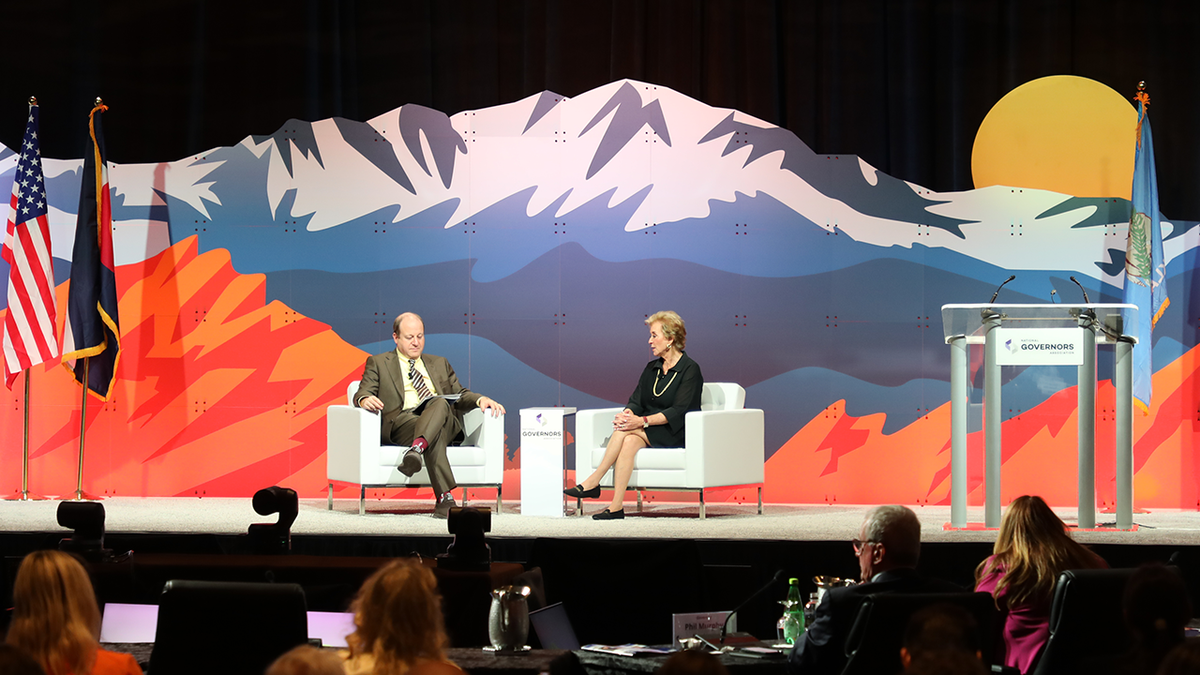
Colorado Gov. Jared Polis, the National Governors Association’s outgoing chair, discusses American education with Education Secretary Linda McMahon at the NGA Summer meeting in Colorado Springs, Colo., Friday, July 25, 2025. (Deirdre Heavey/Fox News Digital)
McMahon assured the governors that now that they have reviewed title funding and gone through the process, «we wouldn’t find ourselves in the same situation.»
Several of the governors who attended Polis and McMahon’s education discussion and had the opportunity to ask questions thanked the education leader for returning the federal title funds to the states.
Polis kicked off the NGA’s summer session in Colorado Springs Friday with his signature policy agenda, «Let’s Get Ready! Educating All Americans for Success.»
EDUCATION SECRETARY LINDA MCMAHON TOUTS COLUMBIA UNIVERSITY’S $200M SETTLEMENT ‘TEMPLATE’
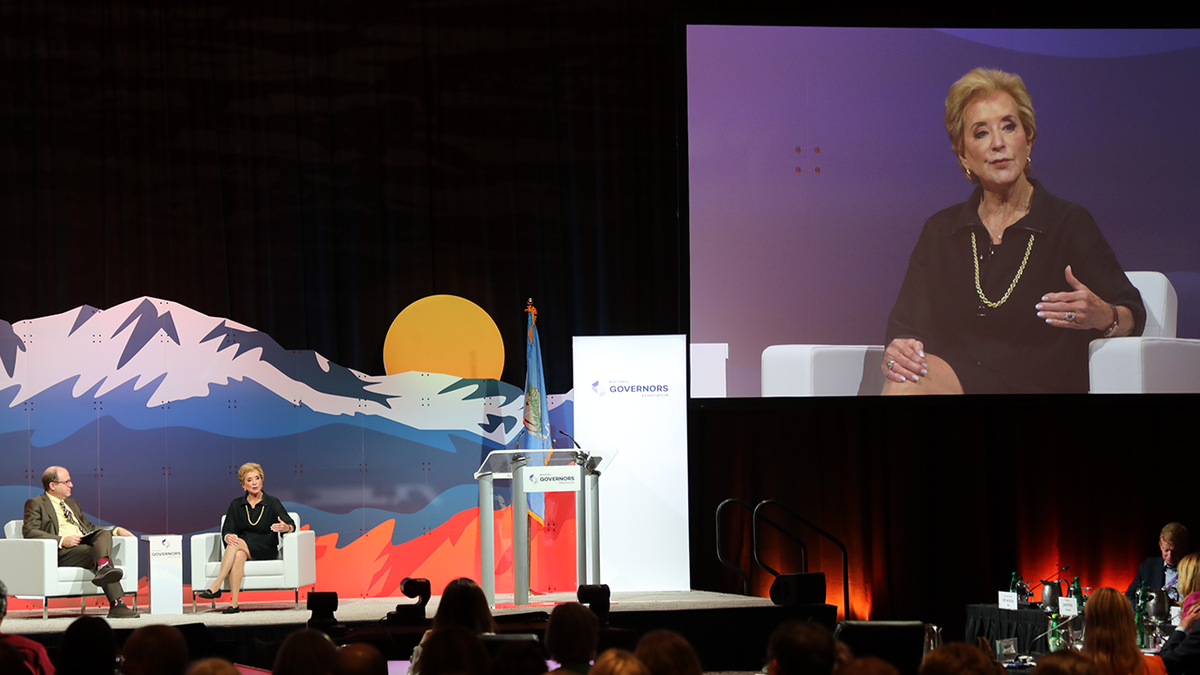
Education Secretary Linda McMahon delivers remarks at the National Governors Association summer meeting in Colorado Springs, Colo., Friday, July 25. (Deirdre Heavey/Fox News Digital)
McMahon said she was appreciative of the governors’ questions and comments, and she committed to visiting as many states and speaking with as many governors as possible to grasp the full scope of the country’s diverse educational needs.
Polis and Stitt said in a joint statement released by NGA that they are «thankful these bipartisan discussions with Secretary McMahon and other key officials during the NGA Summer Meeting led to the distribution of these education funds.»
«This action ensures schools across the nation can maintain essential programs for English language learners, teacher training, and student enrichment as the new academic year begins,» the NGA leaders said, emphasizing that «governors from both parties stand united in prioritizing our children’s education, and we’re proud our advocacy helped secure this vital support for states and districts.»
In an exclusive interview with Fox News Digital ahead of her remarks, McMahon affirmed her commitment to collaborating with governors as the Trump administration seeks to dismantle the Department of Education.
«It’s just incredibly important that if we are going to return education to the states, we have to talk to the governors,» McMahon said.
«Clearly, education is a nonpartisan issue,» McMahon added. «If we’re going to return education to the states, that just means giving them back the part that is now provided by the federal government, and they’re anxious for it.»
CLICK HERE TO GET THE FOX NEWS APP
Trump signed an executive order earlier this year to dismantle the Department of Education, fulfilling one of his key campaign promises during the 2024 presidential election.
Fox News Digital’s Breanne Deppisch contributed to this report.
INTERNACIONAL
Europeans meet with Iranian officials face-to-face for first time since Israel, US bombings as sanctions loom
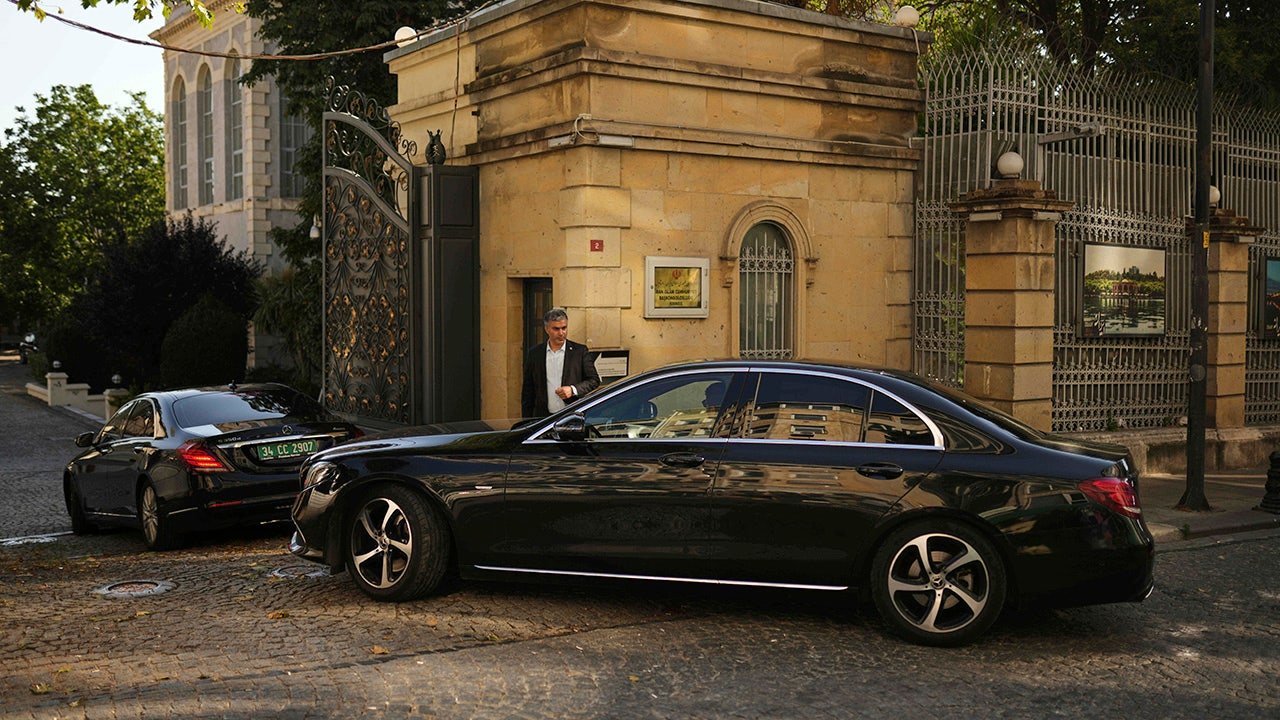
NEWYou can now listen to Fox News articles!
European diplomats met with Iranians on Friday face-to-face for the first time since Israel and the U.S. bombed the country last month.
The «serious, frank and detailed» meeting in Istanbul, Turkey, lasted for around four hours and the officials all agreed to meet again for continued negotiations on Iran’s nuclear program.
Sanctions that were lifted on Iran in 2015 after it agreed to restrictions and monitoring of its nuclear program could be reimposed if Iran doesn’t comply with requirements.
One of Europe’s E3 nations – Britain, France and Germany, who held the talks with Iran – could bring back sanctions under the «snapback» mechanism, which allows one of the European countries to bring back U.N. sanctions if Iran violates the conditions.
IRAN SEEKS CHINA, RUSSIA HELP TO STALL UN SANCTIONS AHEAD OF NUCLEAR TALKS WITH EUROPEANS
Cars, which are believed to carry European diplomats, enter the Iranian consulate ahead of a meeting with Iranian counterparts for talks over Tehran’s nuclear program, in Istanbul, Turkey, Friday, July 25, 2025. (AP Photo/Francisco Seco)
European leaders have also said that sanctions will start being reinstated by the end of August if there is no progress on reining in Iran’s nuclear program.
«A possible delay in triggering snapback has been floated to the Iranians on the condition that there is credible diplomatic engagement by Iran, that they resume full cooperation with the IAEA (International Atomic Energy Agency), and that they address concerns about their highly-enriched uranium stockpile,» a European diplomat said on condition of anonymity before the talks on Friday.
The diplomat added that the snapback mechanism «remains on the table.»
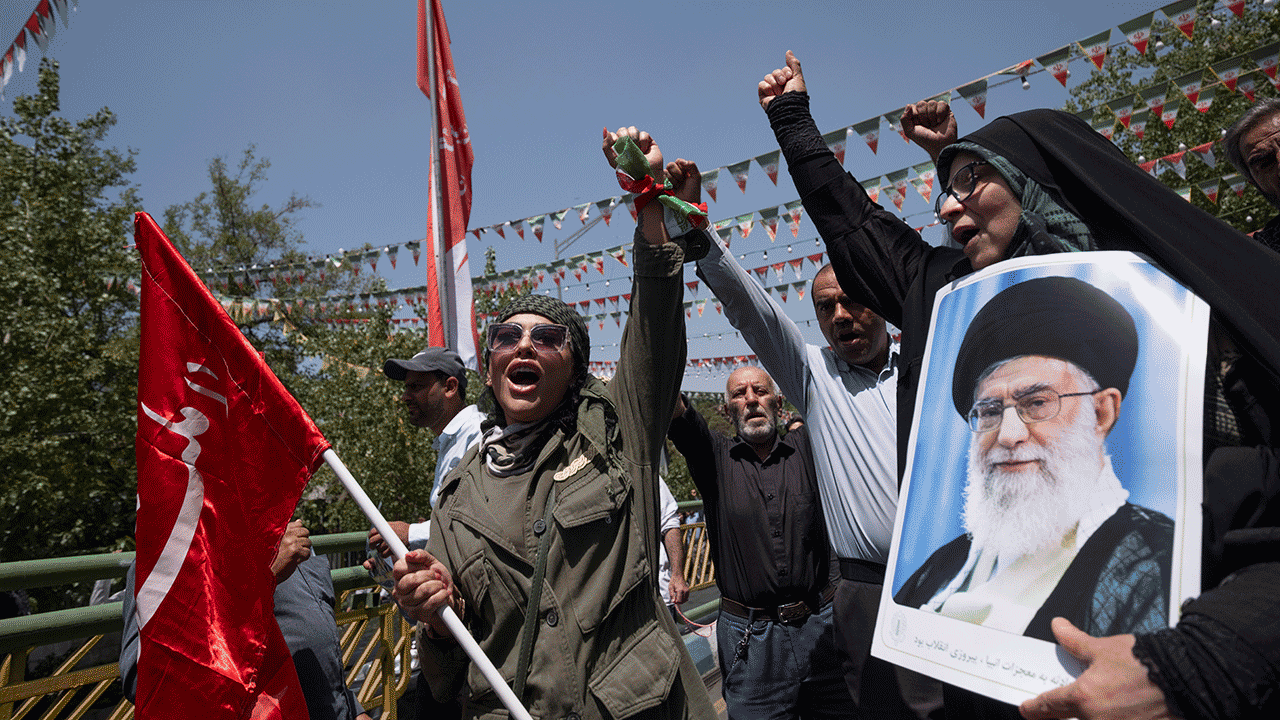
Iranian worshippers shout anti-U.S. and anti-Israeli slogans as one of them holds a portrait of Iran’s Supreme Leader, Ayatollah Ali Khamenei, during an anti-Israeli rally to condemn Israeli attacks on Iran, after Tehran’s Friday prayers in Tehran, Iran, on June 20, 2025. (Photo by Morteza Nikoubazl/NurPhoto via Getty Images)
IRAN VOWS RETALIATION IF UN SECURITY COUNCIL ISSUES SNAPBACK SANCTIONS ON ANNIVERSARY OF NUCLEAR DEAL
Iran said that the U.S. needs to rejoin the 2015 nuclear deal – after President Trump pulled America out of it in 2018 – saying Iran has «absolutely no trust in the United States.»
The U.S. bombed Iran’s nuclear sites on June 22, a little over a week after Israel had bombed the country over national security concerns about its nuclear program.
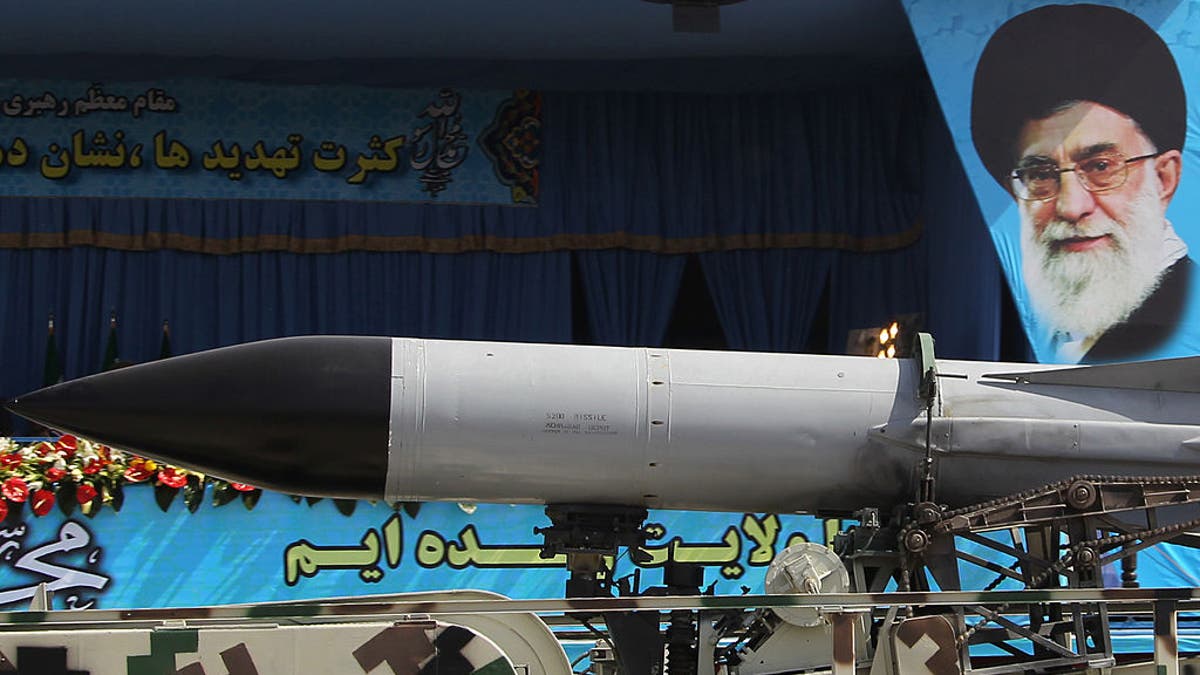
A military truck carries a missile past a portrait of Iran’s Supreme Leader Ayatollah Ali Khamenei during an annual military parade. (ATTA KENARE/AFP/GettyImages))
Iran responded by attacking Israel and a U.S. Army base in Qatar.
Isreal and Iran agreed to a ceasefire on June 24.
CLICK HERE TO GET THE FOX NEWS APP
The IAEA issued a concerning report in May that said that Iran’s stockpile of near-weapons-grade enriched uranium had grown by nearly 50% in three months.
The Associated Press contributed to this report.

 POLITICA2 días ago
POLITICA2 días agoMáximo Kirchner declaró una fortuna de 8.300 millones de pesos: representa un 76% más que el año anterior

 POLITICA1 día ago
POLITICA1 día agoLa justicia de Santa Cruz desafío a la Corte Suprema e incluyó a Cristina Kirchner en el padrón electoral

 POLITICA2 días ago
POLITICA2 días agoQué dijo Javier Milei en la Derecha Fest: las frases más impactantes















